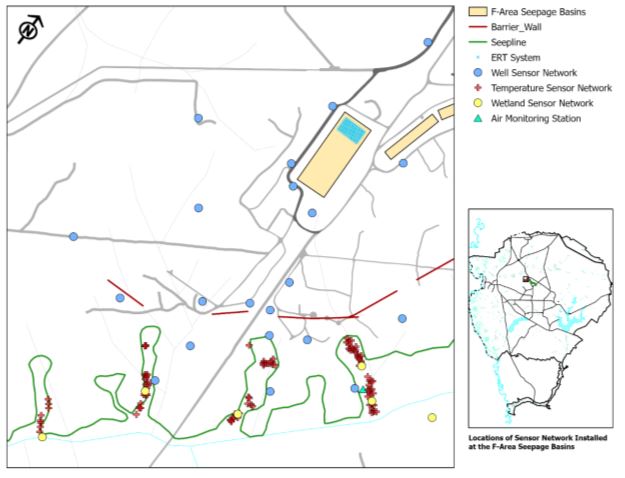About ALTEMIS Project
 Schematic showing the spatial distribution of sensing technologies deployed
Schematic showing the spatial distribution of sensing technologies deployed
at the SRS F-Area Hazardous Waste Management Facility
In this project, we propose to establish the new paradigm of long-term monitoring based on state-of-art technologies – in situ groundwater sensors, geophysics, drone/satellite-based remote sensing, reactive transport modeling, and AI – that will improve effectiveness and robustness, while reducing the overall cost. In particular, we focus on (1) spatially integrative technologies for monitoring system vulnerabilities – surface cap systems and groundwater/surface water interfaces, and (2) in situ monitoring technologies for monitoring master variables that control or are associated with contaminant plume mobility and direction. This system transforms the monitoring paradigm from reactive monitoring – respond after plume anomalies are detected – to proactive monitoring – detect the changes associated with the plume mobility before concentration anomalies occur.
Data Collection
The ALTEMIS project has installed a network of sensors around the Savannah River Site’s F-Area Hazardous Waste Management Facility. Monitoring will be required for decades into the future at the site to ensure that environmental shifts do not promote remobilization of the attenuated contaminants. Hence, using spatially integrative sensing technologies and artificial intelligence and machine learning the ALTEMIS team seeks to implement a proactive long-term monitoring paradigm, whereby monitoring proxy variables allows prediction of the contaminant concentrations in groundwater before plume anomalies occur.
Objectives
The primary objectives of the ALTEMIS AI Data Management Plan are to:
- Establish a robust data management system that effectively collects, stores, and analyzes data from various sources, ensuring consistency and reliability for subsequent AI/ML applications.
- Develop and implement AI/ML algorithms for anomaly detection, change detection, and contaminant predictions, enabling proactive responses to unexpected plume movement and other environmental risks.
- Create a user-friendly web system that allows authorized users to access data, generate reports, and visualize plume behavior, promoting a better understanding of the environmental situation at the SRS.
- Ensure secure and efficient data access using Application Programming Interfaces (APIs), enabling seamless integration with other systems, and facilitating the development of advanced analytics tools and models.
Florida International University is collecting this data for the purpose of using machine learning model to predict future well sensor behavior.